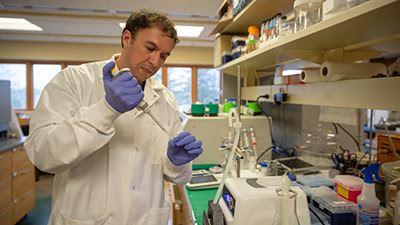What do wilt, zebra mussels and COVID-19 have in common? When it comes to these unrelated and unwelcome invaders, none of them can hide for long from Abdennour Abbas, PhD, and his team at Abbas Research Labs at the University of Minnesota.
If the dictionary were to include the phrase “rapid and early detection,” it’s almost certain there’d be a photo of Abbas alongside it. In recent years, the Associate Professor in the Department of Bioproducts and Biosystems Engineering has spearheaded research to quickly extract DNA to find the fungal agent in infected oak trees before they were diagnosed with oak wilt, a disease fatal to the trees. He and his team developed a similar procedure that tests lake water for DNA signatures in zebra mussels.
Fast-forward to the pandemic of 2020. The U of M asked the academic community including Abbas to donate kits to help with COVID-19 diagnostics and alleviate supply chain problems. His team, including researchers Akli Zarouri and Hamada AbouBakr who spent many hours on evenings and weekends, got straight to work. Using the research on oak wilt (funded by the Minnesota Invasive Terrestrial Plants and Pests Center) and zebra mussels (funded by the Minnesota Aquatic Invasive Species Research Center), and with funding from the University and the National Science Foundation, they developed a new RNA extraction kit for COVID-19 diagnostics — in less than two months.
In June 2020, the U of M Medical School’s COVID-19 Diagnostic Lab* produced a preliminary study comparing the Abbas Lab kits to the widely used kits of a commercial company on real patient samples. The findings showed that the Abbas Lab kits perform better, and even detected a positive patient sample that the commercial kit missed. This is especially important because Abbas and his team make everything in their lab from raw materials — eliminating supply chain issues — at a fraction of the cost of producing commercial kits.
Currently, Abbas Labs has the capacity to produce 100,000 tests per month, with the potential to upscale production to 1 million tests per week by the end of the year. Abbas is confident they can start large-scale production before another expected wave of COVID-19 in the fall.
“We cannot fight pandemics by relying on broken supply chains from companies overseas,” says Abbas. “We have to build a domestic capacity for the development and production of diagnostic kits. Minnesota has multiple companies and groups making antibody tests but does not have companies making diagnostic kits for PCR, and that is exactly the gap we are filling with this technology.” To move the technology to market and help rebuild the production capacity of diagnostic kits in Minnesota, Abbas recently launched a new start-up company, Frontline Biotechnologies, with the mission of triggering a paradigm shift in rapid molecular diagnostic technologies and helping build resilience to future outbreaks.
* The COVID-19 Diagnostic Lab helped with test validation of the new kit. In addition, the project was funded in record time by the U of M Office of the Vice President for Research and the National Science Foundation. Dr. Sagar Goyal and Hamada Aboubakr from the Veterinary Diagnostic Laboratory have helped to test and to validate the technology.
